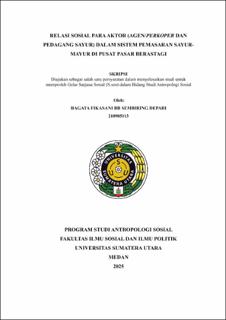Relasi Sosial Para Aktor (Agen/Perkoper dan Pedagang Sayur) dalam Sistem Pemasaran Sayur-Mayur di Pusat Pasar Berastagi
Social Relations of Actors (Agents/Perkopers and Vegetable Traders) in the Vegetable Marketing System at Berastagi Market Center

Date
2025Author
Depari, Hagata Fikasani Br Sembiring
Advisor(s)
Zulkifli
Metadata
Show full item recordAbstract
This study examines the social relations between agents or perkoper and vegetable traders in the vegetable marketing system at the Berastagi Market Center, a traditional market that is the distribution center for agricultural products from the Karo highlands, North Sumatra. Using a qualitative approach, through participatory observation techniques and in-depth interviews with agents and traders. This study seeks to uncover the dynamics of social interactions that underlie trade practices, as well as the cultural meanings that accompany them.
Research findings show that trade relations are formed and maintained through social networks supported by intensive communication, both directly and through communication media such as telephone. In this relationship, trust is the main foundation built through repeated transaction experiences, consistency of product quality, and openness and honesty between actors. In this context, three different trader patterns emerged: (1) traders who established relationships with flexible agents who were willing to adjust prices and quality, (2) traders who took supplies from agents as well as directly from farmers as a supply diversification strategy, and (3) traders who divided supplies between long-standing regular agents and other flexible agents as a form of adaptation to market dynamics.
The analysis was conducted using the social network theory of James S. Coleman and Mark Granovetter. The concept of strong ties and weak ties explains how strong relationships support supply continuity and price stability, while weaker relationships create economic flexibility and network expansion. These findings suggest that economic practices in traditional markets are embedded in local social and cultural structures. Price compromise, tolerance in payments, and solidarity during crises reflect the existence of a moral economy that runs side by side with economic rationality.
Collections
- Undergraduate Theses [987]
